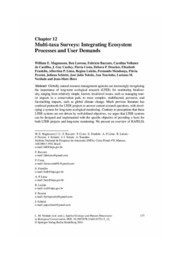Multi-taxa surveys: integrating ecosystem processes and user demands.
Multi-taxa surveys: integrating ecosystem processes and user demands.
Author(s): MAGNUSSON, W. E.; LAWSON, B.; BACCARO, F.; CASTILHO, C. V. de; CASTLEY, J. G.; COSTA, F.; DRUCKER, D. P.; FRANKLIN, E.; LIMA, A. P.; LUIZÃO, R.; MENDONÇA, F.; PEZZINI, F.; SCHIETTI, J.; TOLEDO, J. J.; TOURINHO, A.; VERDADE, L. M.; HERO, J-M.
Summary: Globally, natural resource management agencies are increasingly recognizing the importance of long-term ecological research (LTER) for monitoring biodiversity, ranging from relatively simple, known, local-level issues, such as managing tourist impacts in a conservation park, to more complex, multifaceted, pervasive, and far-reaching impacts, such as global climate change. Much previous literature has confused protocols for LTER projects to answer current research questions, with developing a system for long-term ecological monitoring. Contrary to perceptions that these LTER systems are not driven by well-defined objectives, we argue that LTER systems can be designed and implemented with the specific objective of providing a basis for both LTER projects and long-term monitoring. We present an overview of RAPELD, an LTER system developed in Brazil, with comparable infrastructure established in Australia and Nepal. The standardized biodiversity infrastructure and research platform provides a long-term basis for powerful multi-disciplinary, multi-scale analyses.
Publication year: 2014
Types of publication: Book sections
Unit: Embrapa Territorial
Keywords: Monitoring biodiversity, Natural resources
Observation
Some of Embrapa's publications are published as ePub files. To read them, use or download one of the following free software options to your computer or mobile device. Android: Google Play Books; IOS: iBooks; Windows and Linux: Calibre.
Access other publications
Access the Agricultural Research Database (BDPA) to consult Embrapa's full library collection and records.
Visit Embrapa Bookstore to purchase books and other publications sold by Embrapa.

